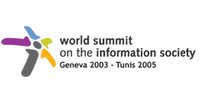 "Freedom in cyberspace is a pre-requisite for an information society."
"Freedom in cyberspace is a pre-requisite for an information society."
The internet is currently "governed" by the United States, in joint guardianship with a semi-private company called ICANN, distrbuting and controlling internet domains of even other sovereign countries. Other nations, particularly from the developing world, have issued their demands for independent, or at least joint, control of internet governance through the United Nations. Hence, today the UN concluded the second phase of the World Summit on the Information Society (WSIS) in Tunis (following its 2003 conference in Geneva).

ICANN is an acronym for the Internet Corporation for Assigned Names and Numbers. ICANN's functions, which currently ipso facto compose the working definition of "internet governance," are technically complicated and largely irrelevant to the political discussion. But, to sum up, ICANN (and therefore the US government) determines who owns areas of the internet and how much bandwidth they can assign for website hosting. [For further background on Internet Governance: see a recent piece in Foreign Affairs, "Who Will Control the Internet?" by Kenneth Neil Cukier, for a nice summary.]
The US monopoly on Internet Governance is primarly controvertial because 1) the internet is international but controlled unilaterally, 2) countries lack control of their own country domains, 3) there is supposedly a limited number of web addresses (debated), and 4) developing countries fear they will miss out on the most desired slices of the net while they develop their technological capacities.
Under the current system the US government can easily "shut-down" the Internet service of any country it has a conflict with.The Bush Administration isn't compromising. This July it unexpectedly issued a decree that it would not share its control of the Internet, pre-emptively undermining the second phase of WSIS.
Although the new extension of the Monroe Doctrine into Internet Governance comically underscores characterizations of the US as an unipolar hegemon, there are good reasons to be as critical of the United Nations taking over the role. Although more democratic and willing to address the needs of developing nations and the national security concerns exogenous to the US, the United Nations is famously racked with its own deficits: best alluded to through a simple mention of the oil-for-food scandal and its on-going shameful inaction in the Dafur genocide. In the more strident words of the BBC:
The United States has long argued that handing control of the internet to the UN or a separate intergovernmental agency would invite slow-witted bureaucratic meddling, which could hinder the internet’s development.In addition, many are justly concerned oppessive regimes like China would use expanded regulatory power to further curtail the free-speech of their citizens. An example of this threat was exemplified at the WSIS conference itself, where the host-country Tunisia dismateld the blog sites of protesters.
However, while the free-wheeling and decentralized culture of the world wide web is largely antagonistic to entities that would curtail the speed of decision making about governance or in any way replace its natural evolution with politicized planning, WSIS has yet recommended a total transfer of such a technolgic and operational role to the United Nations.
After considering several senarios of internet governance arragements from the last summit, this week's talks concluded that teh US would retain control and a global committee would meet annually to discuss governance issues, but without any legislative power. The new Internet Governance Forum (IGF) embodies the ideal conclusion for the US, i.e. nothing will be done and the status quo of US-dominance will reign. The issues of national security, national sovreignty, development goals, and enlarging democratic ownership of the web--what WSIS termed the "multi-stakeholder" goal--are issues all still unresolved. And body charged with nothing but talk is unlikely to bring resolution, particulary when the ultimate veto-holder only shares an interest in hindering action on the issue.

Internet governance is an unfamiliar, abtruse field: a no-man's-land on the fringes of the popular conscisousness and understanding. Ultimately, that probably will not change until the world's less-developed countries are so well-inducted into the technological revolution that their demands for shared governance combine with more ambitious geopolitical goals.
Oh well, perhaps until then IGF can conference online via MIT's newly released $100 lap-tops--powered by a hand-crank and envisioned to belong one a piece to children in developing countries.




0 Comments:
Post a Comment